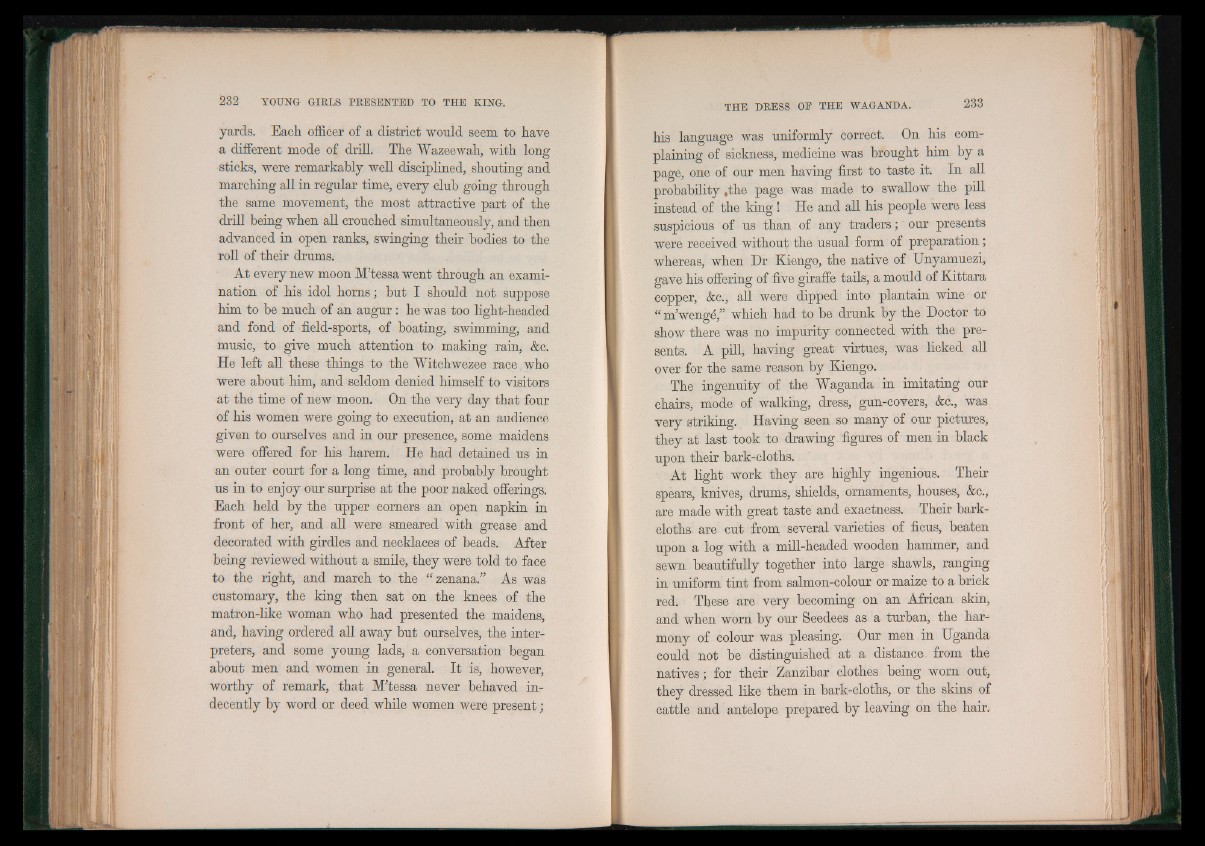
yards. Each, officer of a district would seem to have
a different mode of drill. The Wazeewah,7 with lonOg
sticks, were remarkably well disciplined, shouting and
marching all in regular time, every club goin g through
the same movement, the most attractive part of the
drill being when all crouched simultaneously, and then
advanced in open ranks, swinging their bodies to the
roll of their drums.
At every new moon M’tessa went through an examination
of his idol horns; but I should not suppose
him to be much of an augur: he was too light-headed
and fond of field-sports, of boating, swimming, and
music, to give much attention to making rain, &c.
He left all these things to the Witchwezee race who
were about him, and seldom denied himself to visitors
at the time of new moon. On the very day that four
of his women were going to execution, at an audience
given to ourselves and in our presence, some maidens
were offered for his harem. He had detained us in
an outer court for a long time, and probably brought
us in to enjoy our surprise at the poor naked offerings.
Each held by the upper comers an open napkin in
front of her, and all were smeared with grease and
decorated with girdles and necklaces of beads. After
being reviewed without a smile, they were told to face
to the right, and march to the “ zenana.” As was
customary, the king then sat on the knees of the
matron-like woman who had presented the maidens,
and, having ordered all away but ourselves, the interpreters,
and some young lads, a conversation began
about men and women in general. I t is, however,
worthy of remark, that M’tessa never behaved indecently
by word or deed while women were present;
his language was uniformly correct. On his complaining
of sickness, medicine was brought him by a
page, one of our men having first to taste it. In all
probability .the page was made to swallow the pill
instead of the king I He and all his people were less
suspicious of us than of any traders; our presents
were received without the usual form of preparation;
whereas, when Dr Kiengo, the native of Unyamuezi,
gave his offering of five giraffe tails, a mould of Kittara
copper, See., all were dipped into plantain wine or
“ m’wengd,” which had to be drunk by the Doctor to
show there was no impurity connected with the presents.
A pill, having great virtues, was licked all
over for the same reason by Kiengo.
The ingenuity of the Waganda in imitating our
chairs, mode of walking, dress, gun-covers, &c., was
very striking. Having seen so many of our pictures,
they at last took to drawing figures of men in black
upon their bark-cloths.
At light work they are highly ingenious. Their
spears, knives, drums, shields, ornaments, houses, &c.,
are made with great taste and exactness. Their bark-
cloths are cut from several varieties of ficus, beaten
upon a log with a mill-headed wooden hammer, and
sewn beautifully together into large shawls, ranging
in uniform tint from salmon-colour or maize to a brick
red. These are very becoming on an African skin,
and when worn by our Seedees as a turban, the harmony
of colour was pleasing. Our men in Uganda
could not be distinguished at a distance, from the
natives; for their Zanzibar clothes being worn out,
they dressed like them in bark-cloths, or the skins of
cattle and antelope prepared by leaving on the hair.